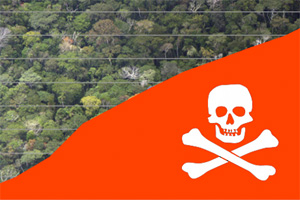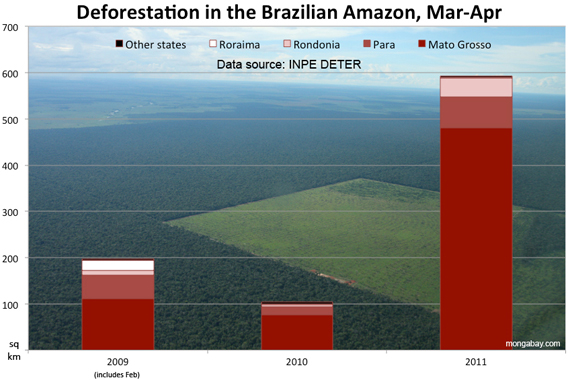Rural social movements oppose Forest Code revisions claimed by the agribusiness lobby to be for their benefit.

Authorities in Brazil have sent an elite police force consisting of 60 officers to offer protection to environmental activists in the Amazon after a series of killings, reports the Associated Press.
The move comes 10 days after Brazil’s Vice President Michel Temer announced the creation of a working group on Amazon violence following the assassinations of three activists in the region in late May. The Brazilian Amazon is no stranger to systemic violence against environmental activists, yet the response from the federal government in the past two weeks is the most significant to date.
On May 24th, environmentalist José Claudio Ribeiro da Silva and his wife, Maria, were gunned down near Marabá, Pará, where the couple worked in a sustainable extractive reserve. Only three days later another prominent activist was killed. The leader of the Amazon Peasants Association, Adelino Ramos, was murdered in front of his family in Vista Alegre do Abunã, Rondonia. Both Ramos and da Silva were vocal opponents of deforestation in the Amazon. The deaths of these activists are being compared to the murder of American nun Dorothy Stang in 2005 and rubber trapper Chico Mendes in 1988, considered martyrs by many.
 Murders tied to land disputes in rural Brazil, cumulative total of 383 since 2000. |
Some have linked the high-profile killings in part to proposed revisions to Brazil’s Forest Code, the country’s primary law addressing deforestation. The revisions have incited tension between those in favor of allowing further clearing in the Amazon and environmentalists who support the original code, drafted in 1965. The revisions, now passed by Brazil’s lower house, loosen restrictions on clearing forests along riverbanks and on hilltops. In addition, under the original law, landholders were required to maintain 80 percent of their lands in forest, and technically could be required to reforest cleared property, however the revised Forest Code would require only 50 percent of land to be preserved, and reforesting will not be required.
Aldo Rebelo, the head of Brazil’s Communist Party, has led the charge against the Forest Code. He argues that existing forest requirements keep small farmers in poverty, however critics say Rebaldo’s claims to represent the rural poor are misleading. Rebelo’s coalition, the “ruralists”, is comprised of industrial agribusiness interests, including the National Agriculture Confederation (CAN). According to Brazil’s Center of Environmental Studies (CEA), Rebelo received R 70,000 ($44,200) from Bunge Fertilizers, an immense multinational agricultural conglomerate based in New York and one of the principal agribusiness firms in Brazil.
Despite their name, the ‘ruralist’ camp does not represent Brazil’s smallscale subsistence farmers, agro-extractivists—who may live in designated extractive reserves–and rural poor of the Amazon. These marginalized groups are largely a part of organizations such as the Movement of Landless Rural Workers (MST), the Movement of Small Farmers (MPA), and the National Federation of Workers in Family Farming (FETRAF)—all of which marched against changes in the Forest Code, which they argue is another design of latifundas (landlords) to remove all obstacles to their dominance of Amazonian society. In fact The MST joined other peasant and student groups to protest the deaths of José and Maria in Marabá, calling on authorities to imprison the killers and improve the region’s justice system to counteract violence against environmental activists, rural community leaders, and advocates of land reform, all of whom face threats from lantifundas.
Indeed, environmentalists, community leaders, and small farmers in the Amazon receive more death threats than similar groups elsewhere in Brazil, according to Globo News. Over the last 20 years, at least 1,150 activists have been murdered in Brazil. Most of these murders were undertaken by assassins hired by loggers, ranchers, or big farmers in order to silence protest against illegal activity, such as deforestation.
“The groups which grew out of land grabbing and clandestine exploitation of natural resources have much more power than the state does. That’s why there is this shocking kind of violence,” asserts Keck, a policy expert with Johns Hopkins University.
Rural Brazil has suffered two periods of intense violence and assassination recently according to Professor Carlos Gonçalves of the Federal University of Rio de Janeiro. In an interview with Ecodebate, Gonçalves says the first period lasted from 1985 to 1990 culminating in the assassination of Chico Mendes, but the second period, which began in 2003, is still ongoing and, considering recent murders, shows no sign of abating.
Despite the epidemics of violence in rural Brazil, few killers are ever brought to trial. According to a 2001 report by the Social Network for Justice and Human Rights, systemic violence against rural leaders and environmental activists in the Amazon routinely ends in impunity for murderers. In southern Pará, where Jose da Silva and his wife Maria were assassinated, 534 rural workers were killed between 1971 and 2001, but just two of the cases were brought to trial, reflecting what the report calls an almost non-existent judicial response to crime in the region.
Repeated death threats have also been historically ignored by authorities. José da Silva, who said several times that he would be killed for speaking out against environmental destruction in the region, appeared on the Pastoral Land Commission (CPT) list of targeted activists for ten years straight before he and his wife were gunned down, according to Globo News. The Brazilian human rights group, CPT, also feared for José da Silva’s wife: she appeared on the CPT list in 2004, 2005, and most recently last year. The other activist killed, Adelino Ramos, received enough death threats to merit placement on the list in 2010. Despite these consistent threats, and the fact that the end result is often murder, police declined to offer any protection to the beleaguered activists. Currently, the CPT says that 125 additional activists may be in mortal danger.

However, the unprecedented governmental meeting on Monday in Brasilia of Brazil’s Justice Minister and the ministers of environment, rural development, and human rights, may represent a seachange in how Brazil responds to violence against activists. The officials aimed to strengthen cooperation between federal and state agencies to combat the epidemic of deforestation-related violence. The state governors of Pará, Amazonas, and Roraima are expected to join the meetings later this week. Specific plans for the implementation of an increase in effective government and policing presence in the Amazon have not been released according to the Associated Press.
However, the Justice Minister, Luiz Barreto, announced that the numerous death-threat cases will be reviewed and protection offered on a case-by-case basis.
“We will not accept these murders, and we will intensify monitoring and investigation and strengthen actions leading to sustainable development in the region,” he stated.
Meanwhile, the CPT released a statement on May 26th condemning Brazil’s government for choosing the ‘rural elite’ over environmental safeguards and human rights:
“CPT reiterates the State’s responsibility for this crime. People’s lives and our natural environment become worthless if they are seen as obstacles to the much-vaunted ‘economic growth’. It is an idea that has been championed by successive federal governments, legislators of the National Congress who pass laws that promote environmental destruction, and by the judiciary who have proven to be extremely efficient in meeting the demands of the rural elite but far slower in trying the crimes committed against rural workers and their allies. The violence feeds off this guarantee of impunity. Paraphrasing the Gospel, we cannot be silent in the face of such barbarism, because if we stay silent, the forests will cry.”
References: Keck, Margaret E. and Kathryn Hochstetler. Greening Brazil: Environmental Activism in State and Society. Duke University Press. Durham: 2007.
Related articles








